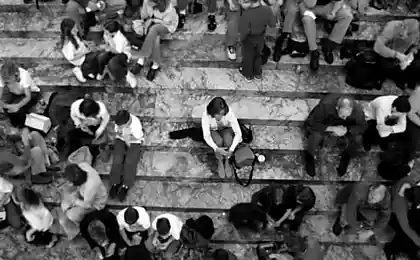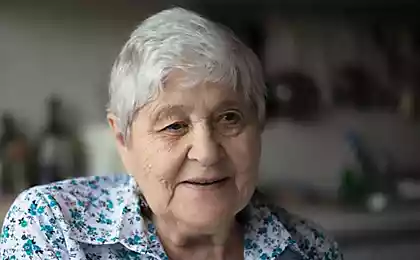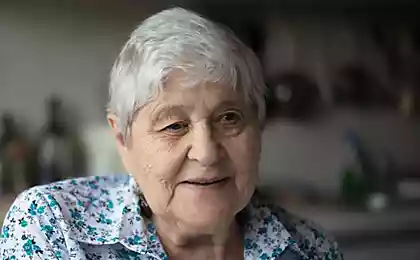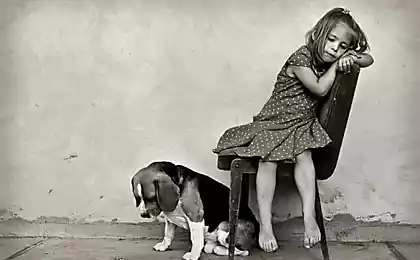658
Julia simultaneously: the 3 sign that you were able to listen to the child
In some cases it is better just to listen to the childThe reasons for the difficulties often hidden in the sphere of his senses. Then practical action is to show, to teach, to guide — will not help him.In such cases it is best... to listen to him. However, differently than we used to. Psychologists found and is described in detail the way to "help hearing", otherwise referred to as "active listening".
Seventy four million six hundred thirty two thousand six hundred forty five
What does it mean to actively listen to the child?Start with situations.
Mother sitting on a Park bench, it runs its three year old in tears: "He took my machine!".
Son returns from school in the hearts throws on the floor, the portfolio, the question of the father replies: "I will not go there!".
Daughter is going to walk; mom says that you should dress warmly, but my daughter is naughty: she refuses to wear "that stupid hat."
In all cases, when a child is upset, hurt, failed, when he's hurt, ashamed, scared when he had been treated rudely or unfairly, and even when he was very tired, the first thing to do is let him know that you know about his experience (or condition), "hear" it.
For this it is best to say what, in your impression, feels now. It is advisable to call "on behalf of" is it a feeling or an experience.
Will repeat in short. If the child has an emotional problem, it is necessary to actively listen.
Actively listen to the child — it means to "return" to him in conversation that he told you, while denoting his feeling.
Let us return to our examples and choose the phrase in which the parent calls the child's sense:
SON: He took my car!
MOM You're very upset and angry with him.
SON: More I will not go there!
DAD: You don't want to go to school.
DAUGHTER: I'm Not going to wear that ugly hat!
MOM: You really like it.
Just note: most likely these answers will seem unusual and even unnatural. Much easier and more familiar to say:
Well, I'll give…
— How can you not go to school?!
— Don't act up, it is a decent hat!
In spite of the apparent validity of these answers, they have one common disadvantage: leave the child alone with his experience.
Their advice or criticism as if the parent tells the child that his experience does not matter, it is not taken into account. In contrast, the responses by way of active listening shows that parent understand the internal situation of the child, ready to hear more about it, to accept it.
Such a literal sympathy of the parent produces the child a very special impression (note, not less, and sometimes much more impact it has on the parent, than a little below). Many parents who first tried calmly to "voice" the child's feelings, talk about the unexpected, sometimes miraculous results. Give two real case.
Mom enters the room of a daughter and sees the mess.
MOM: Nina, do you still not clean his room!
DAUGHTER: Well, mom, then!
MOM You really don't want to get out…
DAUGHTER (suddenly hugged his mother): Mommy, you're so wonderful!
Another case told dad seven year old boy.
He and his son hurried to the bus. The bus was the last, and it was impossible to miss. A little boy asked me to buy chocolate, but the Pope refused. Then resentful son started to sabotage my dad's rush to keep up, to look around, stop for some "emergency" cases. Before dad had a choice: you can't be late, and to drag son forcibly by the hand he didn't want to. And then he remembered our advice: "Denis— he turned to his son,— you're upset that I didn't buy you a candy bar, upset and offended by me."
The result was what dad didn't expect: peaceful boy put his hand in daddy's, and they walked quickly to the bus.
Not always, of course, the conflict is resolved so quickly. Sometimes the child, sensing the willingness of the father or mother to listen to him and understand, willingly continues to talk about the incident. Adult remains the only actively listen to it further.
Give an example of a longer conversation in which my mom several times "announced" that she heard and saw, speaking with a crying baby.
Mother busy with business talk. In the next room playing with her five year old daughter and ten year old son. Suddenly there is a loud cry.
The lament approaches the mother's door, and the corridor starts to twitch handle. Mom opens the door, standing in front of her, buried in the jamb, weeping child, and behind — the confused son.
DAUGHTER: u-U-u-u!
MOTHER: Misha hurt you... (Pause.)
DAUGHTER (crying continues): I drop It-I-Il!
MOM: He pushed you, you fell and hurt yourself... (Pause.);
DAUGHTER (crying, but still in a resentful tone): No, he never caught me.
MOM: somehow, You jumped, and he didn't hold and you fell... (Pause.)
Mike, who with a guilty look standing behind, nodding affirmatively.
DAUGHTER (calmly): Yes... I want you. (Gets to mom's lap.)
MOTHER (after a while): do You want to be with me, and Mike still be offended and not want to play with him…
DAUGHTER: No. He there records to listen, and I'm not interested.
MISHA: Okay, let's go, I you your record will put…
This dialogue gives us the opportunity to draw attention to some important features and rules of conversation according to the method of active listening.
First, if you want to listen to the child, be sure to turn around to face him. It is also very important to him and your eyes were at the same level. If the child is small, sit near him, hold him on hands or knees; you can gently pull the child to her, to approach or to move your chair closer to him.
Avoid contact with the child, while in another room, with his face to the stove or to the sink with the dishes, watching TV, reading a newspaper, sitting back in his chair
or lying on the couch. Your position in relation to it and your posture is the first and most powerful signals about how much you are prepared to listen and to hear. Be very attentive to these signals that good "reads" a child of any age, not even aware of the conscious in mind.
Second, if you are talking with upset or distressed child, do not ask him questions. It is advisable to have your answers sounded in the affirmative.
For example:
SON (grim): I will Not be hanging out with Pete!
PARENT: You're pissed at him.
It may not be replicas:
— What happened?
— What, are you pissed at him?
Why the first sentence of the parent is more successful? Because it immediately shows that the parent is tuned in to the "emotional wave" of the son that he hears and accepts his distress; in the second case, the child may feel that the parent is not with him, and as an external party is interested only in "facts", and interrogates them. In fact, it could be completely wrong and the father, asking the question can completely sympathize with the son, but the fact that the phrase is framed as a question, does not reflect sympathy.
It would seem that the difference between affirmative and interrogative sentences is very slight, sometimes it's just a subtle intonation, and the response to them is very different. Often the question: "What happened?"sorry the child replies, "Nothing!"and if you say, "something happened...", the child is easier to start talking about what happened.
Forty eight million nine hundred nineteen thousand nine hundred fourteen
Thirdly, it is very important in a conversation to "hold a pause".After each of your replica is better to keep silent. Remember that the time belongs to the child; do not hammer his own opinions and comments. Pause helps the child to understand your experience better and at the same time feel that you are near. Quiet well and after the answer of the child — maybe he will add something. To know that the child is not ready to hear your remark, in his appearance. If his eyes do not look at you, and to the side, "inside" or into the distance, then keep silent: it is happening now is very important and necessary internal work.
Fourthly, in your response, it is also sometimes useful to repeat that, as you have seen, happened to the child, and then label it feeling. So, the answer of the father in the previous example could consist of two sentences.
SON (grim): I will Not be hanging out with Pete!
FATHER: don't want to be friends. (Repeat heard).
SON: Yes, don't want…
FATHER (after a pause): You're pissed at him... (Symbol sense).
Sometimes the parents fear that the child will perceive the repetition of his words as teasing. This can be avoided by using other words with the same meaning. For example, in our example, the word "hobnob" father has replaced "friends". Experience shows that if you even use the same phrases, but accurately guess the emotional experience of the child, he usually does not notice anything unusual, and the conversation continues successfully.
Of course, it may happen that the answer you are really just guessing what happened event or feeling of the child. Do not fret, in the next phrase he will correct you. Be attentive to his amendment, and show that you have accepted it.
So, in the example with two children and the mother only the third time guess, what happened with the girl and her brother ("somehow, You jumped, and he didn't resist..."). And after that, my daughter immediately calmed down.
Want to note that the conversation on the way active listening is very unusual for our culture, and it is not easy to master. However, this method will quickly win your likes, once you see the results it yields. Them at least three. They can also be signs that you were able to listen to the child. List them.
1. Disappears or at least weakens the negative experience of the child. Here shows a remarkable regularity: shared joy is doubled, shared sorrow is halved.
2. Child, making sure that adult is ready to listen to him, begins to tell about yourself more: the subject of the story (complaint) is changing, evolving. Sometimes in the same conversation unexpectedly unravels a tangle of problems and stresses.
...Mother of four puts Mary to sleep, and the girl asks to sit with her.
DAUGHTER: Mommy, well, a little, well, bare!
MOTHER: Masha, it's late, everyone's asleep.
DAUGHTER: all day one and one, do not want more!
MOM: You spend the whole day with the kids in the garden playin... (Recalls active listening.) You feel so lonely…
DAUGHTER: Yes, guys a lot, but mom not allowed in the garden.
MOM: You missed me.
DAUGHTER: Miss you and Sasha Petrov fights.
MOM: You're angry. DAUGHTER: It is my game broke! MOM: AND you're upset. DAUGHTER: No, I pushed him that didn't break, and he gave me a cube on the back.
MOM: it Was painful... (Pause.)
DAUGHTER: sick, and you don't!
MOM: You wanted your mom regretted.
DAUGHTER: I wanted to go…
MOM: Go... (Pause.) DAUGHTER: You promised us with Igorka to the zoo together, I'm still waiting, waiting, and you are not!
How often we leave children alone with a load of different experiences of the resolute "Later!", "Time to sleep", while a few minutes of hearing could really calm your baby before bedtime.
Many parents tell us that active listening helped them to first establish contact with their children.
Here is an example from the book Gordon.
The father of a girl of fifteen, after returning from parental courses, where he became acquainted with the method of active listening, found my daughter in the kitchen, chatting with his classmate. Teenagers in unflattering tones, discussed school. "I sat down in the chair,— then told the father and actively listen, for what it's worth. As a result, the boys uttered without closing the mouth, two and a half hours, and during that time I learned about the life of his daughter more than for the previous few years!".
3. The child himself has been the solution to my problem.
Here is almost literally the story of a young female listener of our courses:
"My sister Lena, fourteen years old. Sometimes she comes to visit me. Before the next visit mom called and told me that Lena fell in with bad company. Boys and girls in the company smoke, drink, lure each other's money. Mother is very concerned and wants me to make a move on the sister.
In conversation with Lena talks about her friends. I feel that it spoils the mood. — Lena, I see you are not very nice to say about your friends.
Yeah, not really.
— But you have a real friend.
— Of course, there is a Jackdaw. And the rest... I don't know.
— Do you feel that others might let you down.
— Yes, perhaps…
— You don't know how to treat them.
— Yeah…
— And they are really good for you concern. Lena reacts violently:
Well, no, I would not say! If they treated me well, you wouldn't take the neighbors money on wine and then ask their mom to pay.
— Yes, but... do You think that normal people don't do that.
— Of course, not do that! There's a Daw not friends with them and learns well. And I even have no time to do lessons.
— You began to study is worse.
A teacher even called home, complaining about my mother.
Mom, of course, upset. You feel sorry for her.
— I love mom and don't want her upset, but I just can't help myself. The nature of what I have become terrible. Just that — begin to be rude.
— You understand that being rude is bad, but something inside pushes you to say rude, to offend people…
I don't want to offend anyone. On the contrary, I always think that I want to offend. All the time something to teach…
— Do you think you hurt and teach…
— Well, Yes. Then I understand that they want the best and something right.
— You understand that they are right, but I don't want to show it.
— Yes, but it will think that I have them all and I will always listen.
— The guys from the company don't want to obey their parents…
— They even lie to them.
— Even cheating. If you deceive the parents, then they lie to friends…
— That's it! I understand now. They are the same with money mi lied to me: to give and not going. In General, they bore me, and I in their eyes will tell you that they are.
Lena went home. After a few days my mother called:
Olga Pena apologized to me. Said understood. And in General was a different man — gentle, kind, with no walks, often sitting at home, doing homework, reading. And most importantly — she is very happy. Thank you!»
You met with three positive results, which can be detected (any or all of them) with a good active listening of the child in the course of the conversation.
Gradually, however, the parents begin to detect at least two changes of a more General nature.
First: parents are told about the miracle that children themselves rather quickly begin to actively listen to them.
Says the mother of four Nadia.
The other day sit down to dinner, I put in front of Nadia the plate of food, but she turns away, refuses to eat. Eyes down and think how to say. But then I hear the word daughter:
NADIA: Mamulenka, you're going to cry now…
MOM: Yes,. Nadia, I am sorry that you don't want to eat.
NADIA: I understand you're hurt. You cooked, and I don't eat your lunch…
MOM: Yes, I really wanted to see you liked the dinner. I tried very hard.
NADIA: Okay, mommy, I'll eat it all to the last drop.
And ate it all!
The second change concerns the parents themselves. Very often in the early sessions on active listening this is how they share their unpleasant experience. "You say, they are turning to the psychologist, that active listening helps to understand and feel the child's problem, talk to him heart to heart. At the same time you teach us the way or method how to do it. Learn to construct sentences, to find words, to follow the rules... What is the conversation "heart to heart"? It turns solid "technique", besides uncomfortable, unnatural. Words don't come to mind, phrases turn out clumsy, forced. And in General — not fair: we want the child shared with us the secret, and themselves "used" to it any ways.»
Such or approximately such objections we hear often on the first two or three lessons. But gradually the feelings of parents are starting to change. Usually it happens after the first successful attempts to carry on a conversation with the child differently. Success inspires parents, they begin to relate to different "technique" and at the same time notice something new. They feel that they become more sensitive to the needs and sorrows of the child can more easily accept his "negative" feelings. Parents say that over time they begin to find a more patient, less angry child, it's best to see how and why it is bad. It turns out that "the technique of" active listening is a vehicle for transformation of the parents. We think that "used" her to the children, and it changes us. This is the wonderful hidden property.
As for the concerns of parents regarding the artificiality, "techniques" and "technique" to overcome it helps one comparison that I often cite in the classroom.
It is well known that budding ballerinas spend hours in exercises, far unnatural from the point of view of our ordinary perceptions. For example, they learn the position in which the feet are placed at different angles, including the angle of 180 degrees.
In this "twisted" position of the feet of a ballerina must be free to keep the balance, to squat, to follow the movements of hands... and all it takes for it to then they danced easily and freely, not thinking already about what technique. So it is with communication skills.They are difficult at first and sometimes unusual, but when you master them, the "tech" disappears and goes into the art of communication. published
Author: Yulia Gippenreiter
P. S. And remember, just changing your mind — together we change the world! ©
Source: //lifeyes.info/what-is-depression/homework/gippenreiter-aktivnoje-slushanie/
Seventy four million six hundred thirty two thousand six hundred forty five
What does it mean to actively listen to the child?Start with situations.
Mother sitting on a Park bench, it runs its three year old in tears: "He took my machine!".
Son returns from school in the hearts throws on the floor, the portfolio, the question of the father replies: "I will not go there!".
Daughter is going to walk; mom says that you should dress warmly, but my daughter is naughty: she refuses to wear "that stupid hat."
In all cases, when a child is upset, hurt, failed, when he's hurt, ashamed, scared when he had been treated rudely or unfairly, and even when he was very tired, the first thing to do is let him know that you know about his experience (or condition), "hear" it.
For this it is best to say what, in your impression, feels now. It is advisable to call "on behalf of" is it a feeling or an experience.
Will repeat in short. If the child has an emotional problem, it is necessary to actively listen.
Actively listen to the child — it means to "return" to him in conversation that he told you, while denoting his feeling.
Let us return to our examples and choose the phrase in which the parent calls the child's sense:
SON: He took my car!
MOM You're very upset and angry with him.
SON: More I will not go there!
DAD: You don't want to go to school.
DAUGHTER: I'm Not going to wear that ugly hat!
MOM: You really like it.
Just note: most likely these answers will seem unusual and even unnatural. Much easier and more familiar to say:
Well, I'll give…
— How can you not go to school?!
— Don't act up, it is a decent hat!
In spite of the apparent validity of these answers, they have one common disadvantage: leave the child alone with his experience.
Their advice or criticism as if the parent tells the child that his experience does not matter, it is not taken into account. In contrast, the responses by way of active listening shows that parent understand the internal situation of the child, ready to hear more about it, to accept it.
Such a literal sympathy of the parent produces the child a very special impression (note, not less, and sometimes much more impact it has on the parent, than a little below). Many parents who first tried calmly to "voice" the child's feelings, talk about the unexpected, sometimes miraculous results. Give two real case.
Mom enters the room of a daughter and sees the mess.
MOM: Nina, do you still not clean his room!
DAUGHTER: Well, mom, then!
MOM You really don't want to get out…
DAUGHTER (suddenly hugged his mother): Mommy, you're so wonderful!
Another case told dad seven year old boy.
He and his son hurried to the bus. The bus was the last, and it was impossible to miss. A little boy asked me to buy chocolate, but the Pope refused. Then resentful son started to sabotage my dad's rush to keep up, to look around, stop for some "emergency" cases. Before dad had a choice: you can't be late, and to drag son forcibly by the hand he didn't want to. And then he remembered our advice: "Denis— he turned to his son,— you're upset that I didn't buy you a candy bar, upset and offended by me."
The result was what dad didn't expect: peaceful boy put his hand in daddy's, and they walked quickly to the bus.
Not always, of course, the conflict is resolved so quickly. Sometimes the child, sensing the willingness of the father or mother to listen to him and understand, willingly continues to talk about the incident. Adult remains the only actively listen to it further.
Give an example of a longer conversation in which my mom several times "announced" that she heard and saw, speaking with a crying baby.
Mother busy with business talk. In the next room playing with her five year old daughter and ten year old son. Suddenly there is a loud cry.
The lament approaches the mother's door, and the corridor starts to twitch handle. Mom opens the door, standing in front of her, buried in the jamb, weeping child, and behind — the confused son.
DAUGHTER: u-U-u-u!
MOTHER: Misha hurt you... (Pause.)
DAUGHTER (crying continues): I drop It-I-Il!
MOM: He pushed you, you fell and hurt yourself... (Pause.);
DAUGHTER (crying, but still in a resentful tone): No, he never caught me.
MOM: somehow, You jumped, and he didn't hold and you fell... (Pause.)
Mike, who with a guilty look standing behind, nodding affirmatively.
DAUGHTER (calmly): Yes... I want you. (Gets to mom's lap.)
MOTHER (after a while): do You want to be with me, and Mike still be offended and not want to play with him…
DAUGHTER: No. He there records to listen, and I'm not interested.
MISHA: Okay, let's go, I you your record will put…
This dialogue gives us the opportunity to draw attention to some important features and rules of conversation according to the method of active listening.
First, if you want to listen to the child, be sure to turn around to face him. It is also very important to him and your eyes were at the same level. If the child is small, sit near him, hold him on hands or knees; you can gently pull the child to her, to approach or to move your chair closer to him.
Avoid contact with the child, while in another room, with his face to the stove or to the sink with the dishes, watching TV, reading a newspaper, sitting back in his chair
or lying on the couch. Your position in relation to it and your posture is the first and most powerful signals about how much you are prepared to listen and to hear. Be very attentive to these signals that good "reads" a child of any age, not even aware of the conscious in mind.
Second, if you are talking with upset or distressed child, do not ask him questions. It is advisable to have your answers sounded in the affirmative.
For example:
SON (grim): I will Not be hanging out with Pete!
PARENT: You're pissed at him.
It may not be replicas:
— What happened?
— What, are you pissed at him?
Why the first sentence of the parent is more successful? Because it immediately shows that the parent is tuned in to the "emotional wave" of the son that he hears and accepts his distress; in the second case, the child may feel that the parent is not with him, and as an external party is interested only in "facts", and interrogates them. In fact, it could be completely wrong and the father, asking the question can completely sympathize with the son, but the fact that the phrase is framed as a question, does not reflect sympathy.
It would seem that the difference between affirmative and interrogative sentences is very slight, sometimes it's just a subtle intonation, and the response to them is very different. Often the question: "What happened?"sorry the child replies, "Nothing!"and if you say, "something happened...", the child is easier to start talking about what happened.
Forty eight million nine hundred nineteen thousand nine hundred fourteen
Thirdly, it is very important in a conversation to "hold a pause".After each of your replica is better to keep silent. Remember that the time belongs to the child; do not hammer his own opinions and comments. Pause helps the child to understand your experience better and at the same time feel that you are near. Quiet well and after the answer of the child — maybe he will add something. To know that the child is not ready to hear your remark, in his appearance. If his eyes do not look at you, and to the side, "inside" or into the distance, then keep silent: it is happening now is very important and necessary internal work.
Fourthly, in your response, it is also sometimes useful to repeat that, as you have seen, happened to the child, and then label it feeling. So, the answer of the father in the previous example could consist of two sentences.
SON (grim): I will Not be hanging out with Pete!
FATHER: don't want to be friends. (Repeat heard).
SON: Yes, don't want…
FATHER (after a pause): You're pissed at him... (Symbol sense).
Sometimes the parents fear that the child will perceive the repetition of his words as teasing. This can be avoided by using other words with the same meaning. For example, in our example, the word "hobnob" father has replaced "friends". Experience shows that if you even use the same phrases, but accurately guess the emotional experience of the child, he usually does not notice anything unusual, and the conversation continues successfully.
Of course, it may happen that the answer you are really just guessing what happened event or feeling of the child. Do not fret, in the next phrase he will correct you. Be attentive to his amendment, and show that you have accepted it.
So, in the example with two children and the mother only the third time guess, what happened with the girl and her brother ("somehow, You jumped, and he didn't resist..."). And after that, my daughter immediately calmed down.
Want to note that the conversation on the way active listening is very unusual for our culture, and it is not easy to master. However, this method will quickly win your likes, once you see the results it yields. Them at least three. They can also be signs that you were able to listen to the child. List them.
1. Disappears or at least weakens the negative experience of the child. Here shows a remarkable regularity: shared joy is doubled, shared sorrow is halved.
2. Child, making sure that adult is ready to listen to him, begins to tell about yourself more: the subject of the story (complaint) is changing, evolving. Sometimes in the same conversation unexpectedly unravels a tangle of problems and stresses.
...Mother of four puts Mary to sleep, and the girl asks to sit with her.
DAUGHTER: Mommy, well, a little, well, bare!
MOTHER: Masha, it's late, everyone's asleep.
DAUGHTER: all day one and one, do not want more!
MOM: You spend the whole day with the kids in the garden playin... (Recalls active listening.) You feel so lonely…
DAUGHTER: Yes, guys a lot, but mom not allowed in the garden.
MOM: You missed me.
DAUGHTER: Miss you and Sasha Petrov fights.
MOM: You're angry. DAUGHTER: It is my game broke! MOM: AND you're upset. DAUGHTER: No, I pushed him that didn't break, and he gave me a cube on the back.
MOM: it Was painful... (Pause.)
DAUGHTER: sick, and you don't!
MOM: You wanted your mom regretted.
DAUGHTER: I wanted to go…
MOM: Go... (Pause.) DAUGHTER: You promised us with Igorka to the zoo together, I'm still waiting, waiting, and you are not!
How often we leave children alone with a load of different experiences of the resolute "Later!", "Time to sleep", while a few minutes of hearing could really calm your baby before bedtime.
Many parents tell us that active listening helped them to first establish contact with their children.
Here is an example from the book Gordon.
The father of a girl of fifteen, after returning from parental courses, where he became acquainted with the method of active listening, found my daughter in the kitchen, chatting with his classmate. Teenagers in unflattering tones, discussed school. "I sat down in the chair,— then told the father and actively listen, for what it's worth. As a result, the boys uttered without closing the mouth, two and a half hours, and during that time I learned about the life of his daughter more than for the previous few years!".
3. The child himself has been the solution to my problem.
Here is almost literally the story of a young female listener of our courses:
"My sister Lena, fourteen years old. Sometimes she comes to visit me. Before the next visit mom called and told me that Lena fell in with bad company. Boys and girls in the company smoke, drink, lure each other's money. Mother is very concerned and wants me to make a move on the sister.
In conversation with Lena talks about her friends. I feel that it spoils the mood. — Lena, I see you are not very nice to say about your friends.
Yeah, not really.
— But you have a real friend.
— Of course, there is a Jackdaw. And the rest... I don't know.
— Do you feel that others might let you down.
— Yes, perhaps…
— You don't know how to treat them.
— Yeah…
— And they are really good for you concern. Lena reacts violently:
Well, no, I would not say! If they treated me well, you wouldn't take the neighbors money on wine and then ask their mom to pay.
— Yes, but... do You think that normal people don't do that.
— Of course, not do that! There's a Daw not friends with them and learns well. And I even have no time to do lessons.
— You began to study is worse.
A teacher even called home, complaining about my mother.
Mom, of course, upset. You feel sorry for her.
— I love mom and don't want her upset, but I just can't help myself. The nature of what I have become terrible. Just that — begin to be rude.
— You understand that being rude is bad, but something inside pushes you to say rude, to offend people…
I don't want to offend anyone. On the contrary, I always think that I want to offend. All the time something to teach…
— Do you think you hurt and teach…
— Well, Yes. Then I understand that they want the best and something right.
— You understand that they are right, but I don't want to show it.
— Yes, but it will think that I have them all and I will always listen.
— The guys from the company don't want to obey their parents…
— They even lie to them.
— Even cheating. If you deceive the parents, then they lie to friends…
— That's it! I understand now. They are the same with money mi lied to me: to give and not going. In General, they bore me, and I in their eyes will tell you that they are.
Lena went home. After a few days my mother called:
Olga Pena apologized to me. Said understood. And in General was a different man — gentle, kind, with no walks, often sitting at home, doing homework, reading. And most importantly — she is very happy. Thank you!»
You met with three positive results, which can be detected (any or all of them) with a good active listening of the child in the course of the conversation.
Gradually, however, the parents begin to detect at least two changes of a more General nature.
First: parents are told about the miracle that children themselves rather quickly begin to actively listen to them.
Says the mother of four Nadia.
The other day sit down to dinner, I put in front of Nadia the plate of food, but she turns away, refuses to eat. Eyes down and think how to say. But then I hear the word daughter:
NADIA: Mamulenka, you're going to cry now…
MOM: Yes,. Nadia, I am sorry that you don't want to eat.
NADIA: I understand you're hurt. You cooked, and I don't eat your lunch…
MOM: Yes, I really wanted to see you liked the dinner. I tried very hard.
NADIA: Okay, mommy, I'll eat it all to the last drop.
And ate it all!
The second change concerns the parents themselves. Very often in the early sessions on active listening this is how they share their unpleasant experience. "You say, they are turning to the psychologist, that active listening helps to understand and feel the child's problem, talk to him heart to heart. At the same time you teach us the way or method how to do it. Learn to construct sentences, to find words, to follow the rules... What is the conversation "heart to heart"? It turns solid "technique", besides uncomfortable, unnatural. Words don't come to mind, phrases turn out clumsy, forced. And in General — not fair: we want the child shared with us the secret, and themselves "used" to it any ways.»
Such or approximately such objections we hear often on the first two or three lessons. But gradually the feelings of parents are starting to change. Usually it happens after the first successful attempts to carry on a conversation with the child differently. Success inspires parents, they begin to relate to different "technique" and at the same time notice something new. They feel that they become more sensitive to the needs and sorrows of the child can more easily accept his "negative" feelings. Parents say that over time they begin to find a more patient, less angry child, it's best to see how and why it is bad. It turns out that "the technique of" active listening is a vehicle for transformation of the parents. We think that "used" her to the children, and it changes us. This is the wonderful hidden property.
As for the concerns of parents regarding the artificiality, "techniques" and "technique" to overcome it helps one comparison that I often cite in the classroom.
It is well known that budding ballerinas spend hours in exercises, far unnatural from the point of view of our ordinary perceptions. For example, they learn the position in which the feet are placed at different angles, including the angle of 180 degrees.
In this "twisted" position of the feet of a ballerina must be free to keep the balance, to squat, to follow the movements of hands... and all it takes for it to then they danced easily and freely, not thinking already about what technique. So it is with communication skills.They are difficult at first and sometimes unusual, but when you master them, the "tech" disappears and goes into the art of communication. published
Author: Yulia Gippenreiter
P. S. And remember, just changing your mind — together we change the world! ©
Source: //lifeyes.info/what-is-depression/homework/gippenreiter-aktivnoje-slushanie/
SUPER remedy - 5 powerful recipes for buds and not only
Viktor Frankl: Will to meaning is the most human phenomenon























